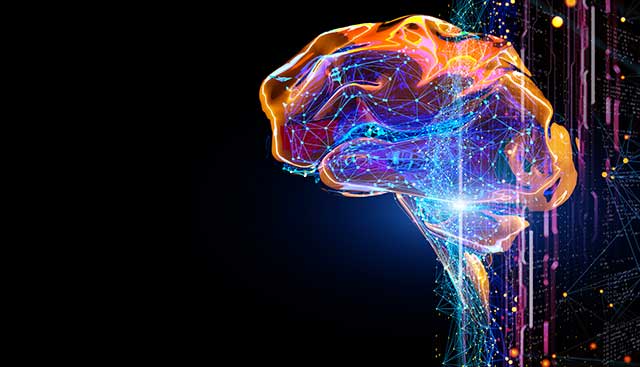Machine Learning League Meetings 2024
 The Machine Learning League (MLL) objective at Moffitt Cancer Center is to advance awareness and application of Machine Learning, Deep Learning, and Artificial Intelligence (AI) across the multiple disciplines in cancer research. This will be achieved by sharing the latest advancements in the field and brainstorming on how they could be applied to solving the cancer problem. In addition, there will be educational sessions on new tools and technologies that are used in machine learning applications.
The Machine Learning League (MLL) objective at Moffitt Cancer Center is to advance awareness and application of Machine Learning, Deep Learning, and Artificial Intelligence (AI) across the multiple disciplines in cancer research. This will be achieved by sharing the latest advancements in the field and brainstorming on how they could be applied to solving the cancer problem. In addition, there will be educational sessions on new tools and technologies that are used in machine learning applications.
League events will include guest lectures, presentations and tutorials, as well as, software tools, packages, and libraries.
The Machine Learning League meetings are held internally typically every other Thursday at noon EST. This is an open invitation to anyone who is interested or wishes to participate in learning and understanding about topics related to machine learning.
| Date | Presenter | Topic | Details | Watch Now |
| Jan. 17, 2024 | Manh-Huong Phan | Opportunities in Nanobiomagnetism and Healthcare Monitoring | Materials science is considered the backbone of modern technologies. Materials are key components in many electronic devices. Nanomaterials with superparamagnetic properties are promising candidates for biomedical applications ranging from hyperthermia therapy to targeted drug delivery, magnetic resonance imaging and biodetection. In this lecture, I will discuss emerging opportunities and technical challenges in this interdisciplinary research field, as well as propose new strategies to overcome the challenges. I will also highlight recent development of a novel, non-invasive, and contactless magnetic sensing platform for real-time tracking and diagnosis of COVID-19 and other respiratory-associated diseases by harnessing magnetism and machine learning. Our technology can be deployed in healthcare facilities and community settings for onsite and remote patient monitoring, which has the potential to improve the overall healthcare system and facilitate more effective public health measures to curb the spread of COVID-19 and its variants. | View recording |
| Jan. 29, 2024 | Prof. Nagarajan Vaidehi | Spatiotemporal Determinants and Allosteric Communication Modulate the Ligand Bias in GPCRs | G-protein coupled receptors (GPCRs) form the largest superfamily of drug targets and also play a critical role in cell signaling. The interactions of GPCRs with the G proteins or b-arrestins to propagate a signaling pathway are inherently often transient and dynamic. However, these interactions exhibit exquisite level of selectivity in some cases or promiscuity in other cases, in coupling to one or multiple partner proteins upon a cell signaling event. Using multi-scale molecular dynamics simulations, allosteric communication methods and interpretable machine learning Bayesian network models in combination with FRET experiments and cell-based assays we have shown that the spatio-temporal components play a critical role in explaining the selective coupling of GPCRs towards G proteins and b-arrestins. We have identified residue pairs that show high cooperativity and their allosteric effect in the GPCR:G protein interface. Our results reveal a strong co-dependency in the formation of interface GPCR:G protein contacts. The MD simulations show that reshaping of GPCR-G protein coupling interface explains the promiscuous coupling of some GPCRs to multiple G proteins. Allosteric communication in signaling proteins play an important role in transducing signal across cell membranes and allosteric modulators are much sought after therapeutics. Delineating the amino acid residues involved in this communication network would allow us to design allosteric ligands that can modulate the potency and efficacy of the orthosteric ligands. Here we show a pathway to identify cryptic druggable binding sites in GPCRs that can be used to identify allosteric ligands. | |
| March 6, 2024 | Hassan Fathallah-Shaykh | Volumetrics in Glioma: A New Standard | The RANO criteria define the current standard of care for longitudinal monitoring of gliomas. I will discuss recent findings that compare volumetric longitudinal measurements to visual inspection and the RANO criteria. I will also present data on AI-facilitated measurements for gliomas. | |
| March 27, 2024 | Dr. Reza Fazel-Rezai | Medical Image Processing and Machine Learning Workflow | Medical images are obtained from various sources including MRI, CT, X-ray, ultrasound, and PET scans. Analyzing these images necessitates a comprehensive environment for data access, visualization, processing, and algorithm development. A key challenge involves extracting quantitative features to generate clinically relevant information using advanced techniques like machine learning algorithms. These features quantify shape, intensity, and texture characteristics within medical images, reducing reliance on subjective interpretation for clinical workflows. During this presentation, we will discuss how MATLAB facilitates those actions for medical images and explore radiomics which captures characteristics not typically visible. |
Awaiting presentation |
| May 13, 2024 | Heather Whitney |
AI of Medical Imaging for Clinical Translation of Radiomics |
Computer-aided diagnosis (CAD) uses artificial intelligence and machine learning (AI/ML) methods to analyze medical images at scale and provide clinical decision-making support. Using ‘big data’ in CAD across the pipeline enhances the potential for impactful clinical tools while also requiring careful attention to the quality of the data. Subsequently, evaluating CAD across the AI/ML pipeline, including at the patient level, is essential for clinical translation. In this talk, I will discuss the need for data in AI development and the role of the Medical Imaging and Data Resource Center (midrc.org). I will also discuss recent projects in advancing methods to evaluate computer output of likelihood of cancer at the patient level, for breast cancer using dynamic contrast-enhanced magnetic resonance imaging.
|
Awaiting presentation |
If you are interested in joining the Machine Learning League distribution list or have any other questions, concerns, or even suggestions please contact Machine Learning at MachineLearning@moffitt.org.
